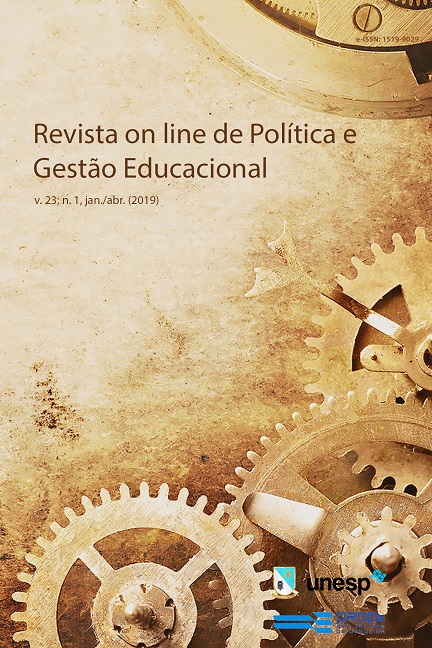Formative meaningfulness and democratic participation: a survey on the teaching of history and literature
DOI:
https://doi.org/10.22633/rpge.v23i1.12309Keywords:
History, Literature, Students, Democratic Participation.Abstract
The research presented here aims to be part of debate of the importance of the humanities and to offer its contribution from an educational point of view. The matter in question is the teaching of the humanities, in particular history and literature though dealt with in an unusual and exploratory way, albeit with a clear purpose: listening to students to find out how and to what extent their voice and intimate involvement in the topic of the study can contribute to a greater understanding of the teaching-learning process and to an improvement in terms of effectiveness of teaching practices, in reference specifically to the two humanistic subjects under scrutiny.
Downloads
References
ALTET, M. La ricerca sulle pratiche d’insegnamento in Francia. Brescia: La Scuola, 2003.
ALTET, M. L’analyse de pratiques: retrospective et questions actuelles. Recherche et Formation, 51, p. 11-25, 2006.
BLANCHARD-LAVILLE C.; FABLET D. (Éds.). Analyser les pratiques professionnelles. Paris: L’Harmattan, 2000.
BRU, M. Pratiques enseignantes: des recherches à conforter et à développer. Revue Françoise de Pédagogie, 138, p. 63-73, 2002.
CHARMAZ, K. Grounded Theory: objectivist and constructivist methods. In: DENZIN, N.; LINCOLN, Y. (Eds.). Handbook of Qualitative Research. Thousand Oaks (CA)-London: Sage (II ed.), 2000. p. 506-535.
CHARMAZ, K. Constructing grounded theory. A practical guide through qualitative analysis. London: Sage, 2006.
COOK-SATHER, A. Authorizing Students’ Perspectives: toward trust, dialogue, and change in education. Educational Researcher, v. 31, n. 4, p. 3-14, 2002.
COULON, A. Le métier d’étudiant. L’entrée dans la vie universitarie. Paris: PUF, 1997.
DAMIANO, E. Prove di formalizzazione. I modelli della Nuova Ricerca Didattica. Pedagogia e Vita, 3, p. 21-57, 1998.
DAY, C.; LANEVE, C. (Eds.). Analysis of Educational Practices. A Comparison of Research Models. Brescia: La Scuola, 2011.
DEWEY, J. Le fonti di una scienza dell’educazione. Firenze: La Nuova Italia, 1967, 1929.
FIELDING, M. Students as Radical Agents of Change. Journal of Educational Change, v. 2, n. 3, p. 123-141, 2001.
FIELDING, M. Beyond Student Voice: Patterns of Partnership and the Demands of Deep Democracy. Revista da Educación, 359, p. 45-65, 2012.
GEMMA, C. Scrittura e memoria. La parola allo studente. Trento: Erickson, 2011.
GEMMA, C. Lo sguardo dello studente. Fotogrammi di vita scolastica. Lecce: Pensa Multimedia, 2012.
GEMMA, C. Lo studente: fonte sussidiaria per l’analisi dell’insegnamento. In: GRION, V.; COOK-SATHER, A. (a cura di), Student Voice. Prospettive internazionali e pratiche emergenti in Italia. Milano: Guerini, 2013. p. 155-165.
GEMMA, C.; GRION, V. (a cura di) Student Voice. Pratiche di partecipazione degli studenti e nuove implicazioni educative. Barletta: Cafagna Editore, 2015.
GLASER, B. Theoretical Sensitivity. Mill Valley (CA): Sociology Press, 1978.
GLASER, B. Basics of grounded theory analysis. Mill Valley (CA): Sociology Press, 1992.
GLASER, B. Doing Grounded Theory. Issues and Discussions. Mill Valley (CA): Sociology Press, 1998.
GLASER, B.; STRAUSS A. The discovery of grounded theory: strategies for qualitative research. Chicago-New York: Aldine de Gruyter), 1967.
GRION, V.; COOK-SATHER, A. (a cura di) Student Voice. Prospettive internazionali e pratiche emergenti in Italia. Milano: Guerini Scientifica, 2013.
GUBRIUM, J. F.; HOLSTEIN, J. A. (Eds.). Handbook of interview research. Context and method. Thousand Oaks (CA): Sage, 2001.
KVALE, S. InterViews. An Introduction to Qualitative Research Interviewing. London: Sage, 1996.
LANEVE, C. Analisi della pratica educativa. Metodologia e risultanze della ricerca. Brescia: La Scuola, 2005.
LANEVE, C. (a cura di), Dentro il “fare scuola”. Sguardi plurali sulle pratiche. Brescia: La Scuola, 2010.
LANEVE, C. Manuale di Didattica. Il sapere sull’insegnamento. Brescia: La Scuola (II ed.), 2017.
NUSSBAUM, M. C. Non per profitto. Perché le democrazie hanno bisogno della cultura umanistica. Bologna: il Mulino, 2011-2010.
PERRENOUD, Ph. Métier d’élève et sens du travail scolaire. Paris: Esf (VIII ed. 2013), 1994.
POLANYI, M. La conoscenza inespressa. Roma: Armando, 1966/1979.
SCHÖN, D. A. Il professionista riflessivo. Per una nuova epistemologia della pratica professionale. Bari: Dedalo, 1983/1993.
SMYTH, J. When students have power: student engagement, student voice, and the possibilities for school reform around «dropping out» of school. International Journal of Leadership in Education: Theory and Practice, v. 9, n. 4, p. 285-298, 2006.
STRAUSS, A.; CORBIN, J. Basics of qualitative research: grounded theory procedures and techniques. Newbury Park: Sage (II ed. 1998), 1990.
TAROZZI, M. Che cos’è la grounded theory. Roma: Carocci (rist. 2015), 2008.












